#TeaTreeEssentialOil
Text
AROMATHERAPY WITH TEA TREE OIL IS SOOTHING AND RELAXING! TRY NOW!!
2 notes
·
View notes
Text
Dementholised Peppermint Oil Can Be Used For Toothpaste And Perfume

Peppermint, with its invigorating aroma and cooling sensation, has been a staple in traditional medicine and home remedies for centuries. But did you know that beyond the familiar minty freshness lies a hidden gem– menthol oil manufacturers in India . This unique oil, extracted from the peppermint plant with the menthol content removed, unlocks a world of applications that extend far beyond toothpaste and mouthwash.
Bhagat aromatics limited - one of the leading Dementholised Peppermint Oil Manufacturers, invites you to explore the exciting possibilities this versatile oil offers. So, buckle up as we delve into the fascinating world of peppermint oil and its diverse uses:
Culinary Delights:
Dementholised peppermint oil adds a subtle, refreshing touch to various culinary creations. A few drops can elevate:
Desserts: Infuse chocolates, ice creams, mousses, and cakes with a delicate minty flavor.
Beverages: Liven up cocktails, mocktails, iced teas, and even lemonade with a hint of mint.
Savory dishes: Experiment with marinades, sauces, dips, and salad dressings for a unique flavor profile.
Baked goods: Add a touch of mint to cookies, breads, and pastries for a delightful twist.
Soothing Skincare:
The cooling and anti-inflammatory properties of it make it a valuable addition to your skincare routine:
Moisturizers: Add a few drops to your moisturizer for a refreshing and calming effect on irritated or sunburnt skin.
Face masks: Create DIY masks with clay, honey, or yogurt for a revitalizing and cleansing experience.
Aftershave: Soothe razor burn and irritation with a homemade aftershave using witch hazel and Natural Peppermint Oil.
Aromatherapy Magic:
Its uplifting aroma makes it ideal for aromatherapy:
Diffuser blends: Combine it with lavender, citrus oils, or eucalyptus for a calming and energizing atmosphere.
Massage oil: Dilute it with a carrier oil like jojoba or almond for a relaxing and invigorating massage.
Inhale directly: Take a few deep breaths to ease headaches, nausea, or motion sickness.
Household Hero:
Dementholised peppermint oil's natural cleaning and deodorizing properties make it a handy household tool:
All-purpose cleaner: Mix it with water and vinegar for a natural and effective cleaner for surfaces.
Air freshener: Create a DIY room spray with water and essential oils for a refreshing scent.
Insect repellent: Combine it with other essential oils like citronella for a natural insect repellent.
Beyond the Ordinary:
The applications of dementholised peppermint oil and Mentha Oil extend even further:
Animal care: Diluted solutions can be used for pest control in pets or to freshen pet bedding.
Yoga and meditation: Diffuse the oil to create a focused and calming environment for practice.
DIY crafts: Add a touch of mint scent to candles, soaps, or potpourri for a unique homemade touch.
Buy Peppermint Oil in India Now!
We, one of the best menthol oil supplier in India, are passionate about providing the highest quality dementholised peppermint oil. Our commitment to sustainable farming practices ensures that our oil is not only pure and potent but also ethically sourced. Visit us to learn more about our commitment to quality and sustainability, and discover how you can incorporate this oil into your daily routine. Ring us now!
#peppermintoil#lavenderoil#essentialoil#essentialoils#lemonoil#peppermint#citronellaoil#gingeroil#peppermintessentialoil#essenzooil#youngliving#teatreeoil#lavenderessentialoil#jualessentialoil#essenzoessentialoil#bergamotoil#teatreeessentialoil#aromatherapy#younglivingindonesia#aromaterapi#peppermintessenzo#juallavenderoil#fenneloil#lemongrassoil#menthol oil manufacturers in india#menthol oil suppliers in india#menthol oil companies in india
0 notes
Text

|| TEA TREE OIL ||
YOU CAN BUY TEA TREE OIL ON OUR WEBSITE: WWW.MAHISHOP.COM
Aromatherapy Delight:
#Mashishopnaturaloils#teatreeoilmahishopsuppliers#mahishopmanufacturere#teatreeoil#teatree#skincare#essentialoils#essentialoil#herbaloil#zslegacyherbs#legacyherbaloil#legacyteatreeoil#skincareroutine#natural#therapyoil#legacyherbs#acne#beauty#oem#jerawat#teatreeessentialoil#lavenderoil#coconutoil#organic#aloevera#naturalskincare#essenzo#skincareproducts
0 notes
Text
Unlock the Power of Tea Tree Oil!

Did you know that tea tree essential oil is a powerhouse of natural goodness? 🌟 From its potent antiseptic properties to its versatile uses for skin and health, this little bottle packs a big punch! 💥 Here's why tea tree oil deserves a prime spot in your wellness arsenal:
✨ Antiseptic Superhero: Tea tree oil is renowned for its powerful antiseptic properties, making it an effective weapon against bacteria, viruses, and fungi. Say goodbye to unwanted germs and hello to clean, refreshed skin!
🌱 Skin Saver: Whether you're battling acne, soothing a sunburn, or dealing with pesky blemishes, tea tree oil is here to rescue your skin! Its anti-inflammatory and antimicrobial properties help calm irritation, reduce redness, and promote clear, glowing skin.
💪 Immune Support: Boost your body's defenses naturally with tea tree oil! Incorporate it into your wellness routine to help fend off colds, flu, and other common ailments, thanks to its immune-boosting benefits.
🍃 Natural First Aid: From minor cuts and scrapes to insect bites and stings, tea tree oil is your go-to solution for all things first aid. Its antiseptic properties help cleanse and protect wounds, promoting faster healing and preventing infection.
🛁 Cleanse and Refresh: Add a few drops of tea tree oil to your bath or shower for a rejuvenating cleanse that leaves you feeling refreshed and invigorated. Its crisp, herbal scent will awaken your senses and lift your spirits!
Ready to experience the magic of tea tree essential oil for yourself? ✨ Incorporate this natural powerhouse into your skincare and wellness routine and let your radiance shine from the inside out! 🌟
#TeaTreeOil#Antiseptic#Skincare#Wellness#NaturalRemedies#teatreeessentialoil#skincare#skincaretips#health#teatreeoiluses#teatreeoilbenefits#Teatreeoilsupplier#teatreeoilmanufacturer#oilinbulk#shopnow#teatreeoilusa#aarnavglobalexports
0 notes
Text
Nature's Secret Arsenal Against Skin Fungus
Some natural ingredients that have been traditionally used to protect skin from fungal infections:
Tea tree oil: Tea tree oil is a popular essential oil with antifungal and antibacterial properties. It can be diluted in a carrier oil, such as coconut oil, and applied topically to the affected area. However, tea tree oil can be irritating to the skin, so it is important to do a patch test before using it on a large area.

Apple cider vinegar: Apple cider vinegar has a slightly acidic pH, which can help create an environment that is less hospitable to fungi. You can dilute apple cider vinegar with water and apply it to the affected area with a cotton ball.
Coconut oil: Coconut oil has antifungal properties and can help moisturize the skin. However, it is important to choose virgin coconut oil, as processed coconut oil may not have the same antifungal effects.
My blog is your one-stop shop for all things Natural Skin Care Ingredients idea, glass skin – skincare routines, product recommendations, and expert tips to achieve that lit-from-within glow, no matter your skin tone or tanning preference.
Garlic: Garlic has antifungal properties and can be applied topically to the skin. However, garlic can also be irritating to the skin, so it is important to do a patch test before using it.
Turmeric: Turmeric has anti-inflammatory and antifungal properties. You can make a paste with turmeric powder and water and apply it to the affected area.
Neem leaves: Neem leaves have antifungal properties and can be used to make a paste or wash.
Here are some tips for protecting your skin from fungal infections:
Keep your skin clean and dry.
Avoid tight-fitting clothing and shoes.
Wear cotton socks and change them daily.
Avoid sharing towels and other personal items.
Maintain a healthy diet and lifestyle.
#beauty#self care#skincare routine#beautytips#naturalskincare#healthylifestyle#glowingskin#beauty tips#organic#naturalingredients#homemade#teatreeessentialoil#apple cider vinegar#garlic
0 notes
Text
Elevate Wellness with EcoPlanet's Tea Tree Aromatherapy Cosmetics 🌿
Spas, salons, and dermatologists, it's time to revolutionize your treatments with the healing power of Tea Tree oil! EcoPlanet offers a premium range of Tea Tree oil-infused aromatherapy cosmetics, perfect for enhancing skin vitality and promoting relaxation. Known for its antimicrobial and anti-inflammatory properties, Tea Tree oil is an essential addition to your services, offering clients natural, effective solutions for skin care. Explore our collection and elevate your practice with nature's best.
Discover more: https://lnkd.in/d7Hnf-Vd
#EcoPlanet #Aromatherapy #TeaTreeOil #NaturalBeauty #WellnessRevolution #SpaEssentials #SalonCare #Dermatology #HolisticHealth #SustainableBeauty
#ecoplanetstore
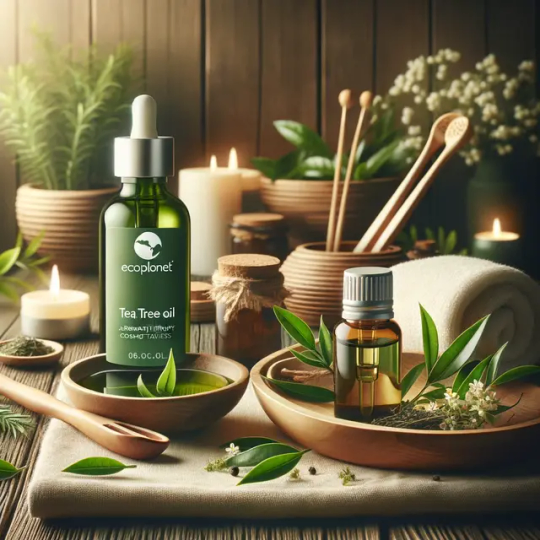
#aromatherapy#ecoplanetstore#ecoplanet#tea tree oil#teatreeessentialoil#skincare#beauty#wellness#essentialoils
0 notes
Text
Exploring the Use of Tea Tree Oil: Remedies, Recipes, and More

The use of tea tree oil has become an increasingly popular essential oil used for a wide variety of health, household, and beauty purposes. This versatile oil, derived from the leaves of the Melaleuca Alternifolia plant, native to Australia (commonly known as the Australian Tea Tree), offers many benefits thanks to its anti-bacterial, anti-fungal, anti-viral, and anti-inflammatory properties.
In this comprehensive guide, we will explore the top uses of tea tree oil, from home remedies to DIY recipes for skin and hair care. You’ll learn how to harness the healing power of tea tree oil to tackle everything from acne to respiratory issues.
We’ll also cover proper dilution and safety precautions for using this potent plant-based oil. Read on to learn about the many other tea tree oil uses!
The Use of Tea Tree Oil is Widespread, So What is Tea Tree Oil and Why Use It?
Essential Oil of Melaleuca Alternifolia
Tea tree oil is an essential oil steam distilled from the leaves of the Melaleuca Alternifolia plant. It is also called melaleuca oil, or Australian tea tree oil. This natural oil has a fresh camphoraceous odor and a color that ranges from pale yellow to nearly colorless and clear.
Tea tree oil contains various compounds like terpinen-4-ol that give it strong antimicrobial, antibacterial, antifungal, and antiviral properties.
The use of tea tree oil also has medicinal benefits thanks to its anti-inflammatory effects that can help treat skin conditions, support wound healing, fight respiratory issues, and more.
Thanks to these therapeutic effects, tea tree oil is used in natural medicines and cosmetics. It’s gentler on the body compared to conventional medications because it’s plant-based, and research shows tea tree oil can be just as effective as prescription options for some health issues.
Tea tree oil is versatile, safe (if used correctly), and cost-effective, so use tea tree oil as a natural remedy and alternative to conventional, potentially harmful products. Do consult with a healthcare professional if you suffer from any serious complaint before switching.
The Use of Tea Tree Oil - YouTube Video
Are Some People Allergic To Tea Tree Oil?
Though the use of tea tree oil is usually well-tolerated, it can occasionally trigger allergic skin reactions in sensitive individuals when applied topically.
While around 1% of people may develop an allergy to tea tree oil components, those with known skin conditions like eczema or dermatitis face a higher relative likelihood of immune responses emerging.
For those with pre-existing sensitivities, immune reactions like redness, rashes, hives, swelling, and itching can manifest where diluted tea tree oil is applied topically. The risk varies on an individual basis, but caution is warranted for this subgroup when adding any new botanical oils to skincare routines.
Signs of possible tea tree oil allergy typically arise within 24-48 hours after contact with your skin. Applying a diluted patch test area first is recommended to screen for allergic reactions before continued use.
Use of tea tree oil should be discontinued if a strong irritation arises and you should wash the area thoroughly with mild soap and water. It is important to seek medical treatment right away for rare acute symptoms like facial puffiness, trouble breathing, or swallowing which signal dangerous anaphylaxis requiring epinephrine intervention.
For most adults, topical tea tree oil suitably diluted is non-allergenic and harmless when used properly on unaffected normal skin. But folks with chronic conditions like eczema or known contact allergies should use them cautiously or should avoid them altogether due to risks.
Consulting a doctor before use is best to ensure safety based on individual health status and risk factors. Essential oil allergies can develop unexpectedly over time as well. So, stay vigilant when integrating any new botanical-based products into your daily health regimens.
How Should You Use Tea Tree Oil?
Topically applied tea tree oil is generally safe when properly diluted; you should avoid ingestion. To reiterate, before applying it to your skin, do a patch test on a small area to check for any allergic reactions first.
Always dilute tea tree oil before use because it’s very potent and can cause skin irritation when applied directly. As a rule of thumb, tea tree essential oil should be mixed with a carrier oil or product in a 1:9 ratio.
For a standard dilution, add 2-3 drops of tea tree oil per teaspoon (about 5ml) of carrier oil like coconut, jojoba, almond, or olive oil.
Now let’s get into the many uses and benefits of this incredible essential oil!
What Are The Health Benefits Of Tea Tree Oil For Skin Problems?
Tea tree oil is used topically for numerous skin conditions and is effective due to its antimicrobial and anti-inflammatory properties:
The Use of Tea Tree Oil For Acne

Propionibacterium Acnes under an electron microscope
Tee tree oil is an effective antibacterial and antimicrobial agent in the treatment of acne. It is great at fighting acne-causing bacteria like Propionibacterium Acnes that clog pores and cause inflammatory breakouts.
Multiple studies show that applying tea tree oil solutions, serums or facial washes can significantly improve mild to moderate acne.
The terpinen-4-ol compound found in tea tree oil helps unblock sebum-clogged hair follicles by dissolving the sebum. This allows pores to drain properly.
The anti-inflammatory properties of tea tree oil also calm the redness and swelling of acne bumps.
Using a 5 percent tea tree oil gel for 8 weeks can reduce acne lesions just as well as a 5 percent benzoyl peroxide lotion, without harsh side effects like peeling and redness.
How Does The Use of Tea Tree Oil Help Treat Athlete’s Foot and Fungal Nail Infections?
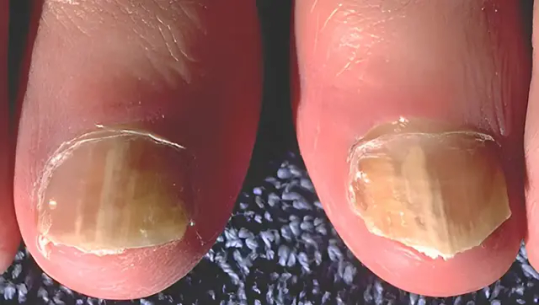
Thanks to its anti-fungal effects, tea tree oil can fight stubborn fungal infections like athlete’s foot and nail fungus.
Fungal infections happen when an opportunistic fungus like dermatophytes or Candida overgrows on the skin, nails, or hair. By damaging the cell walls and membranes of fungi, tea tree oil has been shown to control fungal overgrowth.
For localized fungal infections, use diluted tea tree oil as a topical treatment twice a day for 2-4 weeks until symptoms resolve. Applying a 10% tea tree oil cream helps clear athlete’s foot symptoms of scaling, inflammation, and itching in a few weeks by penetrating the thick skin on the soles.
Applied directly to infected toenails and fingernails, tea tree oil's potent antifungal properties can help clear up stubborn nail fungus infections caused by dermatophytes. The terpinen-4-ol compound penetrates the nail bed to inhibit fungal growth while restoring healthy nails.
Start by cleaning underneath nails, then apply a tiny amount of undiluted tea tree oil on nails and cuticles using a cotton swab or brush twice daily until the fungus is resolved.
For nail fungus, applying 100% tea tree oil to the cuticle and under the nail twice daily can improve discolored or brittle nails.
Does Tea Tree Oil Treat Dandruff or Scalp Conditions?
With its anti-fungal effects, the use of tea tree oil may help in treating dandruff triggered by Malassezia fungus or scalp eczema and psoriasis aggravated by fungal infections.
Adding a few drops of tea tree oil to your favorite shampoo helps reduce flaking and itching. Or try this intensive tea tree oil hair mask to soothe an irritated, flaky scalp:
Mix 5 drops of tea tree oil with 2 tablespoons of coconut oil. Massage into scalp and let soak for 20 minutes. Rinse out and shampoo. Use 1-2 times a week between washes for fast relief.
If you want, you can buy tea tree oil shampoo, instead of creating your own and there are other products containing tea tree oil, such as toothpaste (but always spit it out, never swallow it).
Can The Use of Tea Tree Oil Soothe Eczema, Rosacea, or Psoriasis Flare-Ups?
Thanks to its anti-inflammatory, antimicrobial, and wound-healing benefits, diluted tea tree oil can calm many common skin conditions like eczema, rosacea, and mild psoriasis:
Eczema: Applying a 5% tea tree oil cream for 4 weeks helps ease itchy rashes and clears up eczema skin infections better than a placebo cream, allowing skin to heal faster. Always patch test first.
Rosacea: The antibacterial effect of tea tree oil helps treat secondary skin infections that aggravate rosacea. Mix 2 drops of oil with a dollop of moisturizer and apply to the face twice a day to reduce redness and inflammation.
Psoriasis: Tea tree oil has antimicrobial effects against Staphylococcus Aureus bacteria which may trigger psoriasis flares. Diluted tea tree oil can calm inflamed, scaly patches by reducing cytokine immune activity. Start with a 0.33 to 1 percent dilution.
Can The Use of Tea Tree Oil Help to Treat Cold Sores, Chickenpox, or Shingles?
Thanks to its antiviral effects, the use of tea tree oil can help treat viral skin infections like cold sores, chickenpox, and shingles caused by the herpes simplex virus (HSV). Applying a 6% tea tree oil gel helps heal cold sores faster by inhibiting the virus and reducing blistering better than placebo.
For itchy chickenpox and shingles rashes, add 10-15 drops to a cup of colloidal oatmeal bath soak to ease symptoms. The anti-inflammatory action calms itch and pain, allowing the skin to heal.
Always patch test diluted oil first and stop use if skin becomes irritated.
Does Tea Tree Oil Heal Wounds or Insect Bites Faster?
The antimicrobial benefits of tea tree oil are great for disinfecting and healing minor cuts, burns, and abrasions. It helps prevent wound infections, dry out blisters, and accelerate the wound closure process so the skin heals faster with less scarring.
Just cleanse the area first and apply 2-3 diluted drops onto the wound 1-2 times daily. You can also prevent itching and infection of bug bites by dabbing on some diluted tea tree oil. The anti-inflammatory compounds calm redness, pain, and inflammation.
Can You Make Your Own Hand Sanitizer with Tea Tree Oil?
Certainly! With its strong antiviral, antibacterial, and antifungal effects against common germs, adding a few drops of oil to some aloe vera gel or liquid soap makes a nice natural hand sanitizer.
Just shake together: 1/2 cup aloe vera gel, 1/4 cup liquid castile soap, 10-15 drops tea tree oil, and 10 drops lemon essential oil. Transfer to a dispenser bottle and use as needed.
The tea tree oil kills 99.9% of bacteria while conditioning aloe vera soothes hands. Vitamin E oil helps counter the drying effects of alcohol-based sanitizers. This also makes a great surface cleaner for phones, toys, and counters!
What Respiratory Problems Can Tea Tree Oil Treat?
Thanks to its ability to open up nasal passages and airways, tea tree oil can provide relief for common respiratory complaints like:
Chest and Nasal Congestion:
The expectorant properties help loosen mucus secretions associated with colds, allergies, asthma, and bronchitis so you can breathe more easily. Add 5 drops to a bath or diffuser at home and inhale.
Sinus Infections:
Tea tree oil’s antimicrobial effects help to clear sinus inflammation triggered by bacteria or fungi. Mix 2 drops with coconut oil, massage into sinus areas, and inhale deeply. The vapors help open up nasal airways, too.
Sore Throat:
The use of tea tree oil can help fight strep bacteria and oral thrush fungus that cause sore throats. Add 1 drop to a cup of warm water with lemon and honey and gargle to coat the throat. Avoid swallowing.
Does Tea Tree Oil Repel Insects Naturally?

For a natural bug spray:
Thanks to its strong aromatic scent, tea tree oil can drive away flying and crawling pests like mosquitoes, flies, and ants. mix 10 drops with 2 ounces of witch hazel or aloe vera gel and store in a spray bottle.
The oil helps mask human scents that attract biters. Spritz over exposed skin or around entryways whenever bugs are bothering you.
For an indoor insect-repellent candle:
Add 10-15 drops of melted soy or beeswax and pour into a container with a wick. Light the candle for 2-3 hours in affected rooms to deter pests without having to use toxic chemicals. You can also wipe down surfaces with a tea tree cleaning spray.
Air Freshener and Mold Killer:
Add several drops to a spray bottle filled with water to eliminate bad smells lingering around the house. The anti-fungal action kills mold on tiles, shower curtains, window panes, and sinks while leaving a light, clean scent. Shake well before each use.
Other Household Uses For Tea Tree Oil:
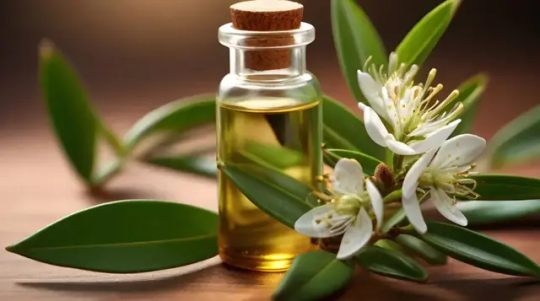
The use of tea tree oil in the home may surprise you, but with its antimicrobial power, tea tree oil is great for household cleaning and odor elimination in bathrooms, kitchens, and other rooms. Use tea tree oil as an alternative to conventional products.
Natural Disinfectant Cleaner:
Mix 20-25 drops with 1/2 cup of apple cider vinegar and 1/4 cup water in a spray bottle. Spritz directly onto kitchen/bathroom counters, floors, toilets, and stoves. Wipe down with a clean, dry cloth.
Rinsing is not necessary since it’s all-natural.
Laundry Booster:
For fresh-smelling laundry without chemicals, add 5-6 drops to damp clothes in the washer drum before starting the normal cycle. The antimicrobial effects of tea tree oil help kill bacteria in fabric fibers.
Fight Oral Plaque
The antibacterial abilities of tea tree oil make it useful for maintaining good oral health. Research indicates adding a small drop to your regular toothpaste when brushing may supplement flossing and brushing by helping reduce the buildup of dental plaque, gingivitis inflammation, and bleeding.
Tea tree oil's plaque-removal actions could even combat foul breath. However, more studies proving safety and ideal concentrations for short and long-term use are still needed.
Relieving Foot Soak
An antifungal foot bath with several drops mixed into the soak water can help treat athlete’s foot triggered by fungus like Tinea Pedis, (it is also the medical name for Athlete's Foot). The warm water opens up skin pores allowing penetration of medicinal tea tree oil. This foot soak simultaneously softens thickened skin on the heels and ball of the foot also prone to painful cracks and calluses.
For an intensive moisturizing foot treatment, add a spoon or two of Epsom Salts as well which reduces soreness. Doing this weekly reduces the chances of transmitting infections through shower or pool surfaces too.
Body Odor Treatment
Tea tree oil's antimicrobial effects may help eliminate underarm body odor. Excessive bacterial buildup on sweaty underarm skin interacts with perspiration to produce embarrassing odors.
Adding a few drops of tea tree oil mixed with some baking soda into your daily bath water can inhibit bacteria.
You can combine baking soda, tea tree oil, and lavender essential oil to make a natural deodorant by mixing a spoonful of baking soda with 5-6 drops of tea tree oil, and a few drops of lavender oil plus enough water to form a paste.
Apply under your arms as a body odor remedy. Its fresh herbal scent leaves underarms smelling clean and refreshes clothing too.
Oral Thrush Treatment
The anti-fungal properties of tea tree oil make it useful against Candida Fungal overgrowth in the mouth or tongue region which causes the condition Oral Thrush or Oral Candidiasis.
Swishing around slightly diluted tea tree oil inside the mouth can help clear discomforts like white patches, soreness, bad breath, and difficulty swallowing or eating.
The oil intake helps control fungal spread by preventing adhesion onto mouth surfaces. However, it does have a pungent taste. Dilute with a teaspoon of water and use cautiously around lips or wounds. Do not ingest tea tree oil or tea tree oil mixtures.
Heal Sunburnt Skin
When skin becomes reddened, inflamed, and painfully sunburnt, applying some diluted tea tree oil provides relief due to its anti-inflammatory and soothing actions. Tea tree helps take down swelling and calm that hot irritated sensation.
Mix a few drops into some aloe vera gel to boost your burn healing by cooling, hydrating, and disinfecting the damaged skin while new layers regenerate.
Be sure to patch test first since sunburnt skin can be more sensitive or reactive to essential oils. Limit sun exposure until recovered.
Treat Vaginal Infections
The antiseptic and antimicrobial effects of tea tree oil can help treat inflamed vaginal tissue caused by irritating fungal and bacterial infections like yeast infections or vaginitis.
Add 5-8 drops diluted in some coconut or almond oil into lukewarm bath water. Soak the inflamed vulva area.
Read the full article
0 notes
Text
Unlock the Power of Tea Tree Essential Oil
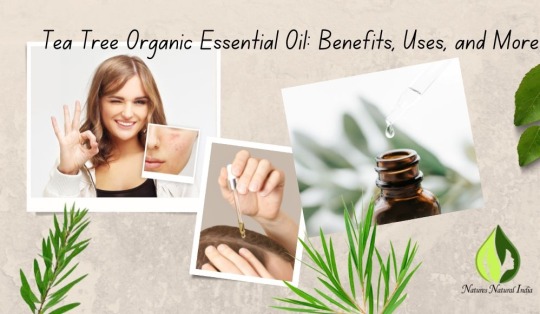
Embrace the natural wonders of Tea Tree Essential Oil with its incredible benefits and versatile uses!
Benefits:
Antimicrobial Marvel: Tea tree oil is a powerhouse against bacteria, viruses, and fungi, making it a go-to for healthy skin and nails.
Skin Soother: Its anti-inflammatory properties can calm irritated skin, helping with acne, eczema, and other skin conditions.
Hair Health Hero: Promote a healthy scalp and luscious locks by incorporating tea tree oil into your hair care routine.
Immune Support: Some studies suggest tea tree oil may lend a hand in boosting the immune system – a natural wellness ally!
Versatile Uses:
Acne-Fighting Face Mask: Mix a few drops with clay for a purifying face mask that bids farewell to blemishes.
Natural Deodorizer: Add a few drops to your DIY deodorant for a fresh and clean scent.
Soothing Scalp Treatment: Blend with a carrier oil and massage into the scalp for a revitalizing hair and scalp treatment.
Aromatherapy Magic: Diffuse tea tree oil to cleanse the air and create a refreshing atmosphere in your home.
Discover the endless possibilities with Tea Tree Essential Oil – nature's gift for a radiant and revitalized you!
#TeaTreeOil#NaturalWellness#EssentialOilsMagic#teatreeessentialoil#teatreeoiluses#teatreeoilbenefits
0 notes
Text

SKINCARE: The natural anti-fungal and anti-bacterial properties help against several skin conditions such as acne and boils. Tea tree oil helps in managing both dry and oily skin.
HAIRCARE: It helps reduce the occurrence of dandruff and may fight against head lice. ?Tea tree oil is effective for dry scalp and helps in reducing scalp inflammation.
#essential oils#organic#natural#camia#skincare#haircare#teatreeessentialoil#tea tree oil#teatree#oil
1 note
·
View note
Text
Unleash the Power of Tea Tree Essential Oil Manufacturer in India - Aromaaz Oils

Unleash the Power of Tea Tree Essential Oil is an example of the pure essence of nature harnessed for holistic well-being, produced by an esteemed business in India. Tea Tree Essential Oil is sourced from the best Melaleuca alternifolia trees and utilizes careful extraction and distillation methods to preserve its potency and therapeutic properties.
#TeaTreeEssentialOil#BuyTeaTreeEssentialOil#TeaTreeEssentialOilsupplier#TeaTreeEssentialOilexporter#TeaTreeEssentialOil OilUsesandBenefits
0 notes
Photo
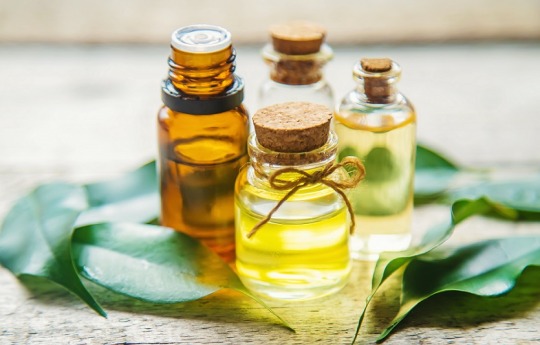
Today’s Spotlight’s: Tea Tree, Eucalyptus & Frankin … https://rntozen.com/blog/aromatherapy/benefits-of-tea-tree-essential-oil-eucalyptus-and-frankincense-essential-oils/?utm_source=tumblr&utm_medium=RN+To+Zen+Social+Media&utm_campaign=RN+To+Zen+Posts
#Aromatherapy#EssentialOilsBenefits#EucalyptusEssentialOil#FrankincenseEssentialOil#TeaTreeEssentialOil
0 notes
Text
JAPANESE PEPPERMINT OIL: UNLOCKING THE BENEFITS FOR MIND AND BODY

INTRODUCTION
In the realm of natural remedies, Japanese Peppermint Oil has emerged as a powerful ally for achieving holistic wellness. menthol oil manufacturers in India Derived from the leaves of the Mentha arvensis plant, this essential oil has been treasured for centuries in traditional Japanese medicine for its myriad benefits. From promoting mental clarity to soothing physical discomforts, Japanese Peppermint Oil offers a wealth of therapeutic properties that can enhance both the mind and body.
In this comprehensive guide, we will explore the fascinating world of Japanese Peppermint Oil, delving into its origins, benefits, and various uses. Whether you are seeking relief from headaches, looking to invigorate your senses, or simply aiming to achieve a state of balance and tranquility, Japanese Peppermint Oil has the potential to transform your well-being.
THE ORIGINS OF JAPANESE PEPPERMINT OIL
Dating back centuries, the use of peppermint in Japanese traditional medicine can be traced to its origins in China. Over time, the cultivation and distillation techniques for extracting the essential oil evolved, leading to the development of Japanese Peppermint Oil. This unique variety, derived from the Mentha arvensis plant, has become renowned for its high menthol content and distinct therapeutic properties.
THE BENEFITS OF JAPANESE PEPPERMINT OIL
1. Enhancing Mental Clarity and Focus
Japanese Peppermint Oil is revered for its ability to stimulate mental clarity and improve focus. The invigorating aroma of the oil can help alleviate mental fatigue, boost concentration, and enhance cognitive function. Incorporating Japanese Peppermint Oil into your daily routine may promote alertness and increase productivity, making it an ideal companion during work or study sessions.
2. Soothing Headaches and Migraines
If you suffer from frequent headaches or migraines, Japanese Peppermint Oil may offer a natural solution for relief. Its menthol content has a cooling effect that can ease tension and reduce pain associated with headaches. Applying a diluted solution of Japanese Peppermint Oil to your temples or inhaling its aroma may provide fast-acting relief from discomfort.
3. Alleviating Digestive Discomforts
Japanese Peppermint Oil has long been used to address various digestive issues, such as indigestion, bloating, and nausea. Its antispasmodic properties help relax the muscles of the gastrointestinal tract, promoting smoother digestion and relieving discomfort. Incorporating Japanese Peppermint Oil into your wellness routine may help alleviate common digestive woes and promote overall gut health.
4. Cooling and Soothing Skin Irritations
When it comes to skincare, Japanese Peppermint Oil offers a range of benefits. Its anti-inflammatory and antimicrobial properties make it a valuable addition to your skincare routine. Applying a diluted solution of Japanese Peppermint Oil to the skin can help soothe irritation, reduce redness, and combat acne-causing bacteria. Additionally, the cooling sensation of the oil provides a refreshing and invigorating effect on the skin.
5. Relieving Muscle and Joint Discomforts
Whether it's from exercise, overexertion, or chronic conditions like arthritis, muscle and joint discomfort can significantly impact your quality of life. Japanese Peppermint Oil's analgesic and anti-inflammatory properties make it a popular choice for relieving such discomforts. Massaging a diluted solution of Japanese Peppermint Oil onto affected areas can help reduce inflammation, ease muscle tension, and provide temporary relief from pain.
6. Promoting Respiratory Health
Japanese Peppermint Oil can be a valuable ally in maintaining respiratory health. Its expectorant properties help clear congestion and alleviate respiratory symptoms, such as coughs and sinus congestion. Inhaling the aromatic vapors of Japanese Peppermint Oil or incorporating it into steam inhalation can provide relief from respiratory discomforts, allowing for easier breathing and improved overall well-being. menthol oil suppliers in India
7. Enhancing Mood and Emotional Well-being
The invigorating scent of Japanese Peppermint Oil has the power to uplift the spirit and promote emotional well-being. Its refreshing aroma acts as a natural mood booster, helping to alleviate feelings of anxiety, stress, and fatigue. Diffusing Japanese Peppermint Oil in your living space or inhaling it directly can create a calming and revitalizing ambiance, allowing you to experience a sense of tranquility and balance.
THE USES OF JAPANESE PEPPERMINT OIL
Aromatherapy
Harnessing the power of Japanese Peppermint Oil through aromatherapy can have profound effects on the mind and body. Diffusing the oil or inhaling its aroma directly can enhance mental clarity, promote relaxation, and improve overall mood. Additionally, incorporating Japanese Peppermint Oil into massage oils or bath blends can provide a rejuvenating and invigorating experience.
Topical Application
Applying Japanese Peppermint Oil topically can target specific areas of concern and provide localized relief. Diluting the oil with a carrier oil, such as jojoba or coconut oil, is essential to prevent skin irritation. Gently massaging the diluted oil onto sore muscles, temples, or the abdomen can help alleviate discomfort, promote relaxation, and improve overall well-being.
Inhalation
Inhaling the aroma of Japanese Peppermint Oil can have immediate effects on mental clarity and emotional well-being. You can simply inhale the oil directly from the bottle or add a few drops to a tissue or cotton ball and inhale deeply. This method can quickly uplift your mood, enhance focus, and provide a burst of energy.
Steam Inhalation
For respiratory discomforts, steam inhalation with Japanese Peppermint Oil can be highly effective. Boil water, transfer it to a bowl, and add a few drops of the oil. Create a tent by placing a towel over your head and inhale the aromatic steam for a few minutes. This method helps clear congestion and provides relief from sinus congestion and respiratory discomforts.
DIY Recipes
Japanese Peppermint Oil can be incorporated into various DIY recipes to enhance its benefits. From homemade muscle balms to refreshing facial mists, the possibilities are endless. By combining Japanese Peppermint Oil with other natural ingredients, you can create personalized wellness products that cater to your specific needs.
PRECAUTIONS AND CONSIDERATIONS
While Japanese Peppermint Oil offers numerous benefits, it's important to exercise caution and follow proper guidelines for safe usage. Here are a few precautions to keep in mind:
Dilute Japanese Peppermint Oil before applying it to the skin to avoid irritation.
Avoid applying the oil near sensitive areas, such as the eyes or mucous membranes.
If you have any underlying medical conditions or are pregnant or breastfeeding, consult a healthcare professional before using Japanese Peppermint Oil.
Keep Japanese Peppermint Oil out of reach of children and pets.
Store the oil in a cool, dark place to maintain its potency and extend its shelf life.
CONCLUSION
Japanese Peppermint Oil is a versatile and potent essential oil that offers a multitude of benefits for both the mind and body. From enhancing mental clarity and focus to alleviating physical discomforts, this oil has been cherished for centuries in traditional Japanese medicine. By incorporating Japanese Peppermint Oil into your wellness routine, you can experience the transformative power of this natural remedy and unlock a world of holistic well-being.
Embrace the invigorating aroma and therapeutic properties of Japanese Peppermint Oil, and embark on a journey towards improved mental and physical vitality. Discover the wonders of this ancient remedy and embrace the harmonizing effects it can have on your mind, body, and spirit. menthol oil companies in India
#peppermintoil#lavenderoil#essentialoil#essentialoils#lemonoil#peppermint#citronellaoil#gingeroil#essenzoindonesia#peppermintessentialoil#essenzooil#youngliving#teatreeoil#lavenderessentialoil#patchoulioil#jualessentialoil#essenzoessentialoil#doterra#eucalyptusoil#bergamotoil#teatreeessentialoil#aromatherapy#younglivingindonesia#aromaterapi#peppermintessenzo#minyakatsiri#juallavenderoil#fenneloil#lemongrassoil
0 notes
Text
Body Odor Control with Tea Tree
Tea TreeBody odor is a common problem that can be embarrassing and uncomfortable. Fortunately, there are natural remedies available to help combat this issue, and one of the most effective solutions is tea tree oil.
How Does Tea Tree Help Control Body Odor?
Tea tree oil is derived from the leaves of the Melaleuca alternifolia plant, which is native to Australia. It has been used for centuries due to its powerful medicinal properties, including its ability to control body odor.
Tea tree oil contains natural antibacterial and antifungal properties, which help eliminate the bacteria that cause body odor. The oil has a refreshing scent that helps mask unpleasant odors, leaving you feeling fresh and confident throughout the day.
Methods of Using Tea Tree for Body Odor Control
Tree Oil Deodorant: Mix a few drops of tea tree oil with a carrier oil, such as coconut oil, and apply it to your underarms. This will help kill odor-causing bacteria and keep you smelling fresh.
Tea Tree Oil Bath: Add a few drops of tea tree oil to your bathwater and soak for 15-20 minutes. This will help cleanse your skin and control body odor.
Tea Tree Oil Spray: Dilute tea tree oil with water and pour it into a spray bottle. Use it as a natural deodorant spray throughout the day.
Tea Tree Oil Bar Soap:
Check out our online shop for Tea Tree Soap Bar.
Precautions and Tips
While tea tree oil is generally safe for topical use, it is important to follow these precautions:
Do a patch test before using tea tree oil to check for any allergic reactions.
Never apply undiluted tea tree oil directly to the skin, as it may cause irritation.
Consult a healthcare professional before using tea tree oil if you have any underlying skin conditions or sensitivities.
Avoid ingesting tea tree oil, as it can be toxic.
Additionally, it's important to maintain proper hygiene practices, such as regular bathing, wearing clean clothes, and using natural fabrics that allow your skin to breathe. These practices, along with the use of tea tree oil, will help you effectively control body odor.
Conclusion
Tea tree oil is a natural and effective solution for controlling body odor. Its antibacterial and antifungal properties help eliminate odor-causing bacteria, while its refreshing scent keeps you feeling fresh and confident. By incorporating tea tree oil into your daily hygiene routine, you can say goodbye to unpleasant body odor and embrace a more pleasant and confident you!
0 notes
Text
Tea Tree Essential Oil For Itchy Scalp
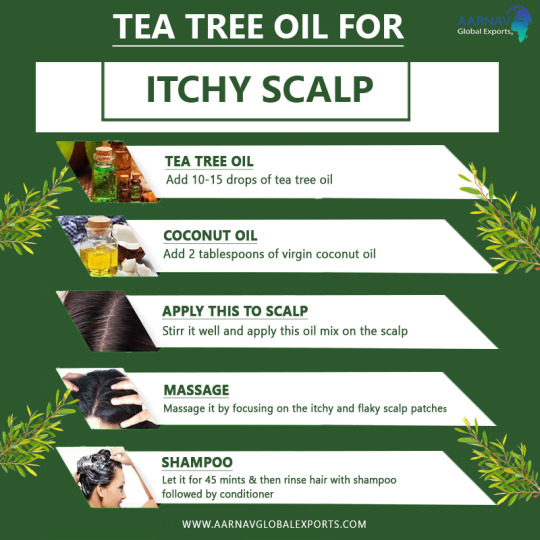
Tired of battling that annoying itch? Tea Tree Essential Oil is here to save the day! 🌟 With its soothing and anti-inflammatory properties, it's the perfect solution for calming irritated scalps. Just a few drops mixed with your favorite carrier oil, and voila! Say hello to relief and goodbye to itchiness. 💆♀️💆♂️
✅ Relieves itchiness and irritation
✅ Natural anti-inflammatory properties
✅ Refreshes and revitalizes the scalp
Experience the soothing sensation of Tea Tree Essential Oil today! 🌱
#TeaTreeMagic#ItchyScalpRelief#NaturalRemedy#teatreeessentialoil#teatreeoilmanufacturer#teatreeoilsupplier#teatreeoilexporter
0 notes
Text
SIVA Tea Tree Essential Oil
Experience the incredible benefits of SIVA Tea Tree Essential Oil. With its powerful antiseptic and antimicrobial properties, this natural oil is perfect for treating acne, soothing skin irritations, and promoting overall well-being. Discover the therapeutic wonders of SIVA Tea Tree Essential Oil today and elevate your self-care routine to a whole new level.
#teatreeessentialoil#PureEssentialOils#EssentialOils#EssentialOilsSupplier#PureEssentialOilsupplierinIndia#SVAOrganics
0 notes
Text

WHAT ESSENTIAL OILS
ARE SAFE FOR THE SKIN?
1 Lavender Oil
2 Tea tree Oil
3 Frankincense Oil
4 Rose Oil
5 Lemon Oil
6 Sandalwood Oil
You can place the order directly on our website www.avinaturals.com
Phone: +917042363832
#avinaturals#avinaturalsessentialoils#naturalsessentialoils#ANO#lavenderessentialoils#teatreeessentialoils#frankincenseessentialoil#roseessentialoils#lemonessentialoil#sandalwoodessentialoil#avinaturalsmanufacturer#avinaturalsindia#avinaturalsdelhi#pureessentialoils#skin#dryskin#olyskin#naturalskin
0 notes